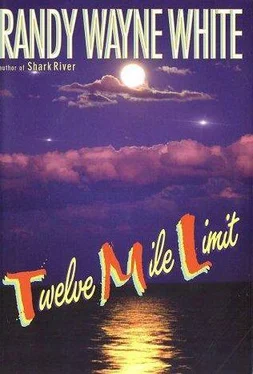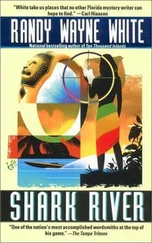Randy White - Twelve Mile Limit
Здесь есть возможность читать онлайн «Randy White - Twelve Mile Limit» весь текст электронной книги совершенно бесплатно (целиком полную версию без сокращений). В некоторых случаях можно слушать аудио, скачать через торрент в формате fb2 и присутствует краткое содержание. Жанр: Триллер, на английском языке. Описание произведения, (предисловие) а так же отзывы посетителей доступны на портале библиотеки ЛибКат.
- Название:Twelve Mile Limit
- Автор:
- Жанр:
- Год:неизвестен
- ISBN:нет данных
- Рейтинг книги:4 / 5. Голосов: 1
-
Избранное:Добавить в избранное
- Отзывы:
-
Ваша оценка:
- 80
- 1
- 2
- 3
- 4
- 5
Twelve Mile Limit: краткое содержание, описание и аннотация
Предлагаем к чтению аннотацию, описание, краткое содержание или предисловие (зависит от того, что написал сам автор книги «Twelve Mile Limit»). Если вы не нашли необходимую информацию о книге — напишите в комментариях, мы постараемся отыскать её.
Twelve Mile Limit — читать онлайн бесплатно полную книгу (весь текст) целиком
Ниже представлен текст книги, разбитый по страницам. Система сохранения места последней прочитанной страницы, позволяет с удобством читать онлайн бесплатно книгу «Twelve Mile Limit», без необходимости каждый раз заново искать на чём Вы остановились. Поставьте закладку, и сможете в любой момент перейти на страницу, на которой закончили чтение.
Интервал:
Закладка:
Twelve Mile Limit
Randy Wayne White
The Simiadae then branched off into two great stems, the New World and the Old World monkeys; and from the latter at a remote period,
Man, the wonder and the glory of the Universe, proceeded.
Charles Robert DarwinPrologue
On Sunday, November 4, a Coast Guard helicopter was operating fifty-two nautical miles off Marco Island on the west coast of Florida, when a crewman spotted a naked woman on the highest platform of a 160-foot navigational tower.
In the crew chief’s report, the woman was described as a “very healthy and fit” redhead. The woman was waving what turned out to be a wet suit. She was trying to attract the helicopter crew’s attention.
The helicopter, a Jayhawk H-60, was in the area searching for a twenty-five-foot pleasure boat that had been reported overdue nearly two days earlier. According to the report, the motor vessel, Seminole Wind, had left Marco on Friday morning with a party of one man, three women. According to relatives, the foursome had planned to spend the day offshore, fishing and SCUBA diving, but did not return Friday afternoon as expected. The Coast Guard had been searching for the Seminole Wind since Friday night. The crew of the Jayhawk was looking for a disabled boat, not a naked woman waving a wet suit from a light tower.
The helicopter flew east past the tower, banked south, then hovered beside the platform. One of the crew signaled the woman with a thumbs-up. It was a question. The woman signaled a thumbs-up in return-she was okay. Then the woman wiggled into her wet suit, climbed down to a lower platform, and dived into the water. The crew of the Jayhawk dropped a basket seat and winched her aboard.
It was 9:54 A.M.
The woman they rescued was thirty-six-year-old Amelia Gardner of St. Petersburg, a passenger on the vessel that had been reported overdue, the Seminole Wind.
According to the Coast Guard report, the woman was given a mug of coffee from a Thermos and asked what happened. She replied that she’d been a guest on a boat that sank. When the crew chief asked where the boat had sunk, Gardner replied, “Oh dear, God! You mean you haven’t found them?”
She was referring to the two women and one man who’d been aboard with her: the boat’s owner, Michael Sanford, age thirty-five, of Siesta Key; Grace Walker, twenty-nine, a Sarasota realtor; and Janet Mueller, thirty-three, who lived on a houseboat at Jensen’s Marina on Captiva Island and worked part-time for Sanibel Biological Supply, a business owned by a man named Marion Ford.
A Coast Guard crewman shook his head and told the distraught woman, “Nope. We’ve had crews searching for thirty-six hours straight and no one’s seen a thing.”
Gardner told the crew that Sanford’s boat had swamped and capsized at around 3 P.M. Friday while anchored over the Baja California, a wreck they’d been diving. She said the four of them had held on to the anchor line until the boat finally sank at around 7 P.M. and they were set adrift. By then, it was dark, waves had gotten bigger, the wind stronger, and she was gradually swept away from the others in rough seas. Because she had no other options, Gardner began swimming toward the light tower, which she’d been told was approximately four miles away.
“I never thought I was going to make it,” she told the crew chief. “I was sure I was going to die.”
She said that it was a little after 11 P.M., according to her dive watch, when she finally reached the tower, climbed up the service ladder, and collapsed, exhausted, on the lower platform. She’d been on the tower since 11 P.M. Friday-thirty-five hours-and she told them she was very thirsty. She was sunburned, she had barnacle cuts on her hands and legs, and she appeared to be suffering from exposure.
When Gardner was offered the option of being flown to a hospital or remaining on station, she replied that she wanted the helicopter to continue searching. She told crewmen that all three of her companions were wearing wet suits and inflated BCD vests, buoyancy compensator devices. “We’ll find them, we’ve got to find them,” she said, and offered to help the crew get Loran-an electronic navigational system that aids mariners in determining positions at sea-coordinates for the California wreck from her former dive instructor, who lived aboard a trawler at Burnt Store Marina near Punta Gorda.
The crew chief told Gardner that they already had the coordinates for the wreck.
The helicopter crew, with Gardner aboard, searched for two more hours but found nothing-nor did what, by now, was an even bigger search group that included a second H-60 helicopter, a C-130 fixed wing aircraft, the Coast Guard’s eighty-two-foot cutter Point Swift, and a forty-one-foot utility cruiser. The U.S. Coast Guard Auxiliary and other volunteers were also providing boats and crew, but the smaller vessels could not search offshore because the wind was now blowing twenty knots out of the east-northeast.
Hopes of recovering the three missing divers remained high, however. They were all young, all in good shape, and they were all wearing wet suits and inflated vests.
As one of the Coast Guard staff assured Gardner, “Don’t worry, we’re the very best in the world at finding people lost at sea.”
Which is true.
1
On the bright and blustery November afternoon when we first got word that our friend, Janet Mueller, was one of three people missing after a boating accident, I was working in the lab of my little wooden stilt house at Dinkin’s Bay Marina, Sanibel Island, Florida. I’d spent most of the morning testing salinity and oxygen content in my aquaria while serving as reluctant referee in an argument that had been going on for way, way too many days between my friend, Tomlinson, and my sister, Ransom Ebanks.
Well, actually, she’s not my sister, and her last name is no longer Ebanks. She’s a first cousin, the daughter of my late and much crazed uncle, Tucker Gatrell. My only cousin, and my only living family on my mother’s side. However, she’s introduced herself as my sister so widely and consistently to fellow islanders that I no longer attempt to set the record straight. If people are willing to believe that I am the brother of a lanky, busty, coconut-brown Bahamian woman who wears Obeah beads braided into her hair and makes blood offerings on the full moon, so be it. She is smart and savvy, with a bawdy sense of humor, plus a brand of fierce independence too rarely seen in men or women, so I’ve come to consider the association a compliment.
What they’d been arguing about was what lots and lots of people all along the Gulf of Mexico are arguing about. It’s the new save-the-manatee laws. The West Indian manatee is a horse-sized, prehistoric mammal with a fluke tail that is as slow in the water as it is slow intellectually. Because of its pug face and teddy-bear countenance, it evokes an emotional response from people, me among them. The manatee is one of my favorite sea creatures.
They have been among the favorites of many over the years-but for very different reasons. For centuries, people hunted manatee for their meat and skin, and still do in Cuba and Nicaragua-impoverished, desperate nations-and in Asia and Africa, too, where a similar species is known as a dugong.
In the United States, we stopped hunting the animal for food long ago. But we continue to kill them with our powerboats. After watchdog organizations filed lawsuits against the Army Corps of Engineers and the U.S. Fish and Wildlife Service, the feds, working with state bureaucrats, have proposed restricting or closing thousands of hectares of public waters to private boaters in an effort to save the few thousand animals that remain.
Читать дальшеИнтервал:
Закладка:
Похожие книги на «Twelve Mile Limit»
Представляем Вашему вниманию похожие книги на «Twelve Mile Limit» списком для выбора. Мы отобрали схожую по названию и смыслу литературу в надежде предоставить читателям больше вариантов отыскать новые, интересные, ещё непрочитанные произведения.
Обсуждение, отзывы о книге «Twelve Mile Limit» и просто собственные мнения читателей. Оставьте ваши комментарии, напишите, что Вы думаете о произведении, его смысле или главных героях. Укажите что конкретно понравилось, а что нет, и почему Вы так считаете.












